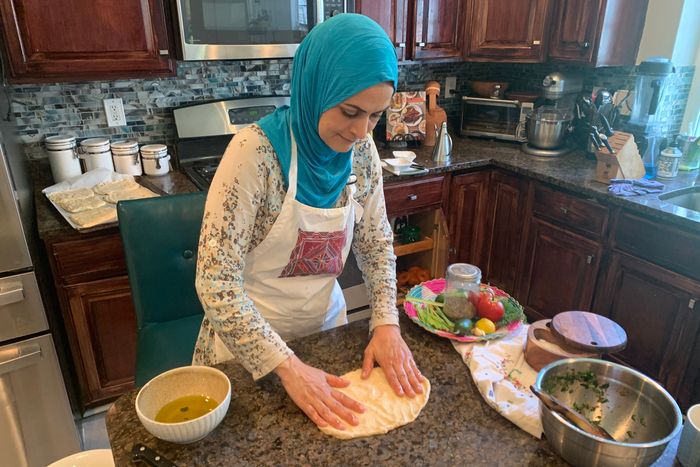Save this article to read it later.
Find this story in your accountsSaved for Latersection.
It is as simple as asking: Is there olive oil tonight?

The ability to celebrate and laugh and cook is an act of resistance, El-Haddad says.
How are you managing?Its very overwhelming.
It can feel suffocating at times.
And I was double-checking with my family.
I was literally told to scroll through the list of Palestinians.
It seems like a basic premise, but were hearing our own presidentdeny our death.
I was newly married and had been living in Boston.
It was very difficult.
I was in a city I didnt know and I needed to get back.
Im like, No, were not.
We dont get used to this and we shouldnt have to.
Gaza has always been considered to be one of two things: victim or aggressor.
You were born in Kuwait and grew up in the Gulf.
As a child, wed visit on a yearly basis.
If you didnt renew it, you would become de facto refugees and not be allowed to return back.
Every Palestinian has this moment when they understand what it is to be Palestinian.
What was crossing the border into Gaza like?Traumatizing.
Youd be told to strip completely naked and then your clothes would be thrown into a pile.
And that was just to be able to go back.
From there, youd have to endure multiple Israeli occupation checkpoints and curfews.
I think it was Rashid Khalidi who said your Palestinian-ness becomes apparent on borders.
We didnt understand until we got older why she did it.
But then, we became resentful almost for a different reason.Why didnt you take us more?
I wanted to immerse myself fully in my home that I had been removed from.
Reading your books, you mention that your grandfather had a farm in Gaza.
It was completely flattened.
I had just started my masters at the Harvard Kennedy School when I heard the news.
I believe it was punitive.
How did you make your way toward writingThe Gaza Kitchenwith Maggie Schmitt?
I may not have fully grasped what the Palestinian struggle was about, but I could taste it.
This was especially the case being from Gaza.
Early on I recognized there was something different about our food.
All tahina, not just red tahina.
When I went back in 2019 with the World Food Program, that is exactly what I observed.
It was horrifying and sad.
Not a single one had olive oil in their house.
They were making a lot of lentil-based dishes, the one bowl meal.
Those usually rely on olive oil or even going further back, with sesame oil.
Sesame oil and olive oil were the two main staple fats in Palestine.
You need that rich, hearty fat because theres no meat.
In another household, they hadnt had fish for six months.
The only fish they were able to eat was frozen fish that was brought from Thailand somehow.
And they cant afford even that fish.
The naval blockade is very extreme; its at most like three or four nautical miles.
When things ease up, it can go up to eight or so.
The local population cant even afford the smaller fish that might be caught, like sardines.
You were living and working in Gaza in 2005 when Israel first disengaged from the territory.
How did Israels disengagement and subsequent sanctions and blockade after the election affect the agricultural industries in Gaza?
Were those the primary economic exports?Yes, along with textiles.
Recently, a clip from Anthony BourdainsParts Unknownhasgone viral.
How was that experience for you?It was amazing.
The producers initially seemed to suggest they just wanted to use me for background information.
I said, No, I want to go.
I want to be there.
But this producer kept sidelining me: We cant do anything.
So I went by myself.
I went through Egypt and I met Tony in Gaza City.
What can we do?
After they had treated me like shit.
When we made it happen, it was surreal.
And I just cannot believe what I just saw.
This is going to implode very soon, and its not going to be pretty.
He was truly disgusted with what he had just seen coming out of the West Bank.
They actually listened to what matters to people there and took that seriously.
They listened to them talk about the villages they were displaced from without questioning it.
No one had covered Gaza in the mainstream media the way that Tony had before that.
What did he say to that?Let me see if I can find the original email from him.
He said, I couldnt agree more.
We fought like hell though, to tell the stories we did the best we could tell them.
And Im on balance pretty happy with the result, though I have definite reservations.
In any event, all the right people are infuriated.